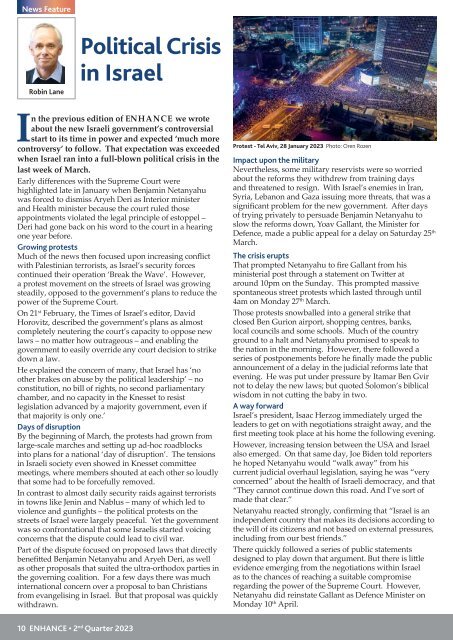ENHANCE - 2nd Quarter 2023
The second quarter 2023 edition of our ‘Enhance’ magazine has articles on perseverance, Innovation: Africa, King Charles III, and bagels; as well as reports on our strategic prayer conference, a Jerusalem forum and the political crisis in Israel; and a Hebrew word study on ‘Emunah’ (faith).
The second quarter 2023 edition of our ‘Enhance’ magazine has articles on perseverance, Innovation: Africa, King Charles III, and bagels; as well as reports on our strategic prayer conference, a Jerusalem forum and the political crisis in Israel; and a Hebrew word study on ‘Emunah’ (faith).
You also want an ePaper? Increase the reach of your titles
YUMPU automatically turns print PDFs into web optimized ePapers that Google loves.
News Feature<br />
Robin Lane<br />
Political Crisis<br />
in Israel<br />
In the previous edition of <strong>ENHANCE</strong> we wrote<br />
about the new Israeli government’s controversial<br />
start to its time in power and expected ‘much more<br />
controversy’ to follow. That expectation was exceeded<br />
when Israel ran into a full-blown political crisis in the<br />
last week of March.<br />
Early differences with the Supreme Court were<br />
highlighted late in January when Benjamin Netanyahu<br />
was forced to dismiss Aryeh Deri as Interior minister<br />
and Health minister because the court ruled those<br />
appointments violated the legal principle of estoppel –<br />
Deri had gone back on his word to the court in a hearing<br />
one year before.<br />
Growing protests<br />
Much of the news then focused upon increasing conflict<br />
with Palestinian terrorists, as Israel’s security forces<br />
continued their operation ‘Break the Wave’. However,<br />
a protest movement on the streets of Israel was growing<br />
steadily, opposed to the government’s plans to reduce the<br />
power of the Supreme Court.<br />
On 21 st February, the Times of Israel’s editor, David<br />
Horovitz, described the government’s plans as almost<br />
completely neutering the court’s capacity to oppose new<br />
laws – no matter how outrageous – and enabling the<br />
government to easily override any court decision to strike<br />
down a law.<br />
He explained the concern of many, that Israel has ‘no<br />
other brakes on abuse by the political leadership’ – no<br />
constitution, no bill of rights, no second parliamentary<br />
chamber, and no capacity in the Knesset to resist<br />
legislation advanced by a majority government, even if<br />
that majority is only one.’<br />
Days of disruption<br />
By the beginning of March, the protests had grown from<br />
large-scale marches and setting up ad-hoc roadblocks<br />
into plans for a national ‘day of disruption’. The tensions<br />
in Israeli society even showed in Knesset committee<br />
meetings, where members shouted at each other so loudly<br />
that some had to be forcefully removed.<br />
In contrast to almost daily security raids against terrorists<br />
in towns like Jenin and Nablus – many of which led to<br />
violence and gunfights – the political protests on the<br />
streets of Israel were largely peaceful. Yet the government<br />
was so confrontational that some Israelis started voicing<br />
concerns that the dispute could lead to civil war.<br />
Part of the dispute focused on proposed laws that directly<br />
benefitted Benjamin Netanyahu and Aryeh Deri, as well<br />
as other proposals that suited the ultra-orthodox parties in<br />
the governing coalition. For a few days there was much<br />
international concern over a proposal to ban Christians<br />
from evangelising in Israel. But that proposal was quickly<br />
withdrawn.<br />
Protest - Tel Aviv, 28 January <strong>2023</strong> Photo: Oren Rozen<br />
Impact upon the military<br />
Nevertheless, some military reservists were so worried<br />
about the reforms they withdrew from training days<br />
and threatened to resign. With Israel’s enemies in Iran,<br />
Syria, Lebanon and Gaza issuing more threats, that was a<br />
significant problem for the new government. After days<br />
of trying privately to persuade Benjamin Netanyahu to<br />
slow the reforms down, Yoav Gallant, the Minister for<br />
Defence, made a public appeal for a delay on Saturday 25 th<br />
March.<br />
The crisis erupts<br />
That prompted Netanyahu to fire Gallant from his<br />
ministerial post through a statement on Twitter at<br />
around 10pm on the Sunday. This prompted massive<br />
spontaneous street protests which lasted through until<br />
4am on Monday 27 th March.<br />
Those protests snowballed into a general strike that<br />
closed Ben Gurion airport, shopping centres, banks,<br />
local councils and some schools. Much of the country<br />
ground to a halt and Netanyahu promised to speak to<br />
the nation in the morning. However, there followed a<br />
series of postponements before he finally made the public<br />
announcement of a delay in the judicial reforms late that<br />
evening. He was put under pressure by Itamar Ben Gvir<br />
not to delay the new laws; but quoted Solomon’s biblical<br />
wisdom in not cutting the baby in two.<br />
A way forward<br />
Israel’s president, Isaac Herzog immediately urged the<br />
leaders to get on with negotiations straight away, and the<br />
first meeting took place at his home the following evening.<br />
However, increasing tension between the USA and Israel<br />
also emerged. On that same day, Joe Biden told reporters<br />
he hoped Netanyahu would “walk away” from his<br />
current judicial overhaul legislation, saying he was “very<br />
concerned” about the health of Israeli democracy, and that<br />
“They cannot continue down this road. And I’ve sort of<br />
made that clear.”<br />
Netanyahu reacted strongly, confirming that “Israel is an<br />
independent country that makes its decisions according to<br />
the will of its citizens and not based on external pressures,<br />
including from our best friends.”<br />
There quickly followed a series of public statements<br />
designed to play down that argument. But there is little<br />
evidence emerging from the negotiations within Israel<br />
as to the chances of reaching a suitable compromise<br />
regarding the power of the Supreme Court. However,<br />
Netanyahu did reinstate Gallant as Defence Minister on<br />
Monday 10 th April.<br />
10 <strong>ENHANCE</strong> • 2 nd <strong>Quarter</strong> <strong>2023</strong>
















